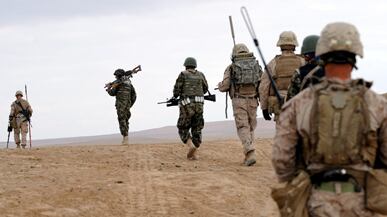A British parliamentary committee released a trenchant analysis of the country's policy in Afghanistan and Pakistan, which of necessity raises fundamental questions about America's role there as well.
The report concludes that al Qaeda has been largely defeated, and that the United States must undertake serious negotiations with the Taliban in order to achieve a political settlement in Afghanistan. The committee slams Pakistan for offering safe havens for Afghan insurgents, while at the same time it warns that the United States must be careful not to further undermine the stability of Pakistan.

Britain has been America's most important combat ally in Afghanistan, and the war is a highly contentious issue here, far more so than in the United States. The country has the second largest troop contingent in Afghanistan, and 358 servicemen and women have been killed there since 2001.
Each and every combat death is reported on the evening news and in the newspapers, often accompanied by deeply touching interviews with the man or woman's family and friends, and scenes from the funeral cortege through small villages.
The House of Commons Foreign Affairs Committee began an inquiry into the government's Afghanistan policy last July, shortly after the Labour Party was voted out of office, replaced by a Coalition Government of the Conservative and Liberal Democrat parties. The 261-page report was released on Wednesday.
The terrorist threat is now largely internal, not external, and better policing, not more soldiers fighting, and dying, in Afghanistan and Iraq is the appropriate response.
The committee, which is made up of five Conservative members of parliament, five Labour and one LibDem, concluded that after 10 years, and in despite of the "significant resources" that have been poured into Afghanistan, "the U.K. has not yet achieved its stated goals." The principal one is a "stable and secure" Afghanistan, from which British forces can withdraw by 2015. What's more, the committee doubts whether these ambitious aims are achievable.
That said, the committee notes that the goal of protecting Britain's national security has apparently been achieved, "given the limited strength of al-Qaeda." The conclusion that al Qaeda no longer presents a serious security threat to the West has been stated here by numerous intelligence officials. The terrorist threat is now largely internal, not external, and better policing, not more soldiers fighting, and dying, in Afghanistan and Iraq is the appropriate response, British intelligence officials have said.
The committee also reinforces what other British and American officials have been saying lately: al Qaeda operates from Pakistan more than Afghanistan. "The continuing existence of Pakistani safe havens for Afghan insurgents makes it extremely difficult, if not impossible," for the allied troops in Afghanistan to defeat the insurgents, the committee said.
Still, the committee urges the United States to more carefully calibrate its policy toward Pakistan. One of the Obama administration's principal military weapons in Afghanistan has been drone attacks on suspected insurgents hiding in the Pakistani safe havens. The committee calls this "a high-risk strategy," because of the potential for leading to political instability in Pakistan—the attacks infuriate Pakistanis, and the government secretly allows the United States to carry them out, while publicly condemning them, a facade that no longer fools most Pakistanis. Overall, the committee concluded that a military solution is not achievable in Afghanistan, which is not likely to be disputed by American commanders. This then highlights the need for a political solution. And the United States must take the lead in reaching one, the committee says.
"We conclude that the U.S. is facing a rapidly closing window of opportunity to push ahead with political reconciliation through which it can help to bring peace and stability to Afghanistan and the wider region and, in the process, ensure that the sacrifices made by allies and Afghans alike are not in vain," the committee wrote. The committee is unequivocal that the United States "should not delay its significant involvement in talks with the Taliban leadership because, with the U.S.'s support in this respect, there can be no-longer-term peace in Afghanistan."
Raymond Bonner has been an investigative reporter and foreign correspondent for The New York Times, and has written for The New Yorker and the New York Review of Books. He now lives in Britain






